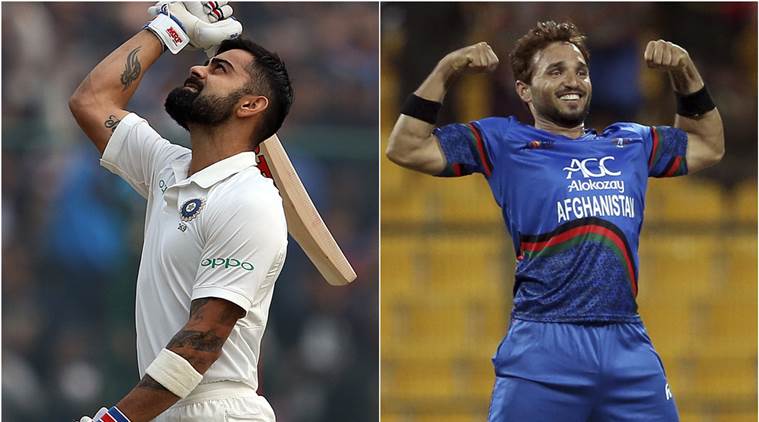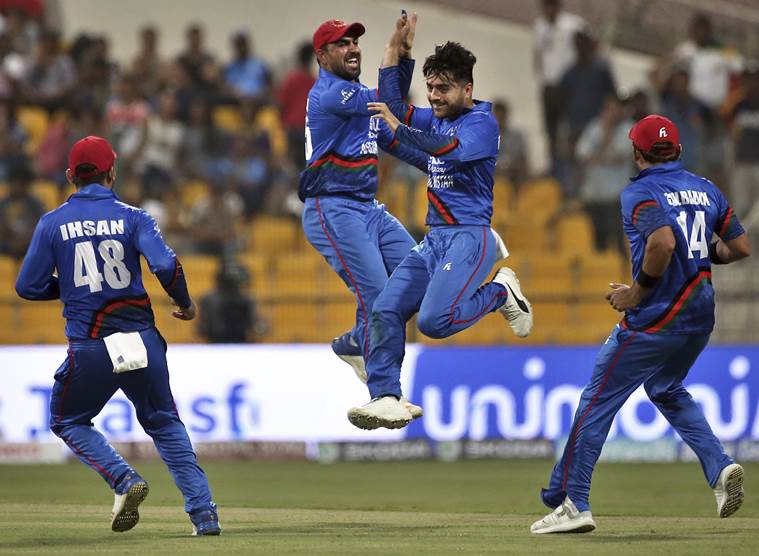 Virat Kohli has an indirect role in Afghanistan’s collective fitness awareness. (Source: Express Archive/AP)
Virat Kohli has an indirect role in Afghanistan’s collective fitness awareness. (Source: Express Archive/AP)
“Being professional players, we have to be ready for the next game, not matter the recovery period — 16 hours, or 10 hours, or 12 hours. We can play right now as well. We improved our fitness over the last five-six months. Sixteen hours more than enough for us to recover.” That was Rashid Khan after his Man of the Match performance in the Asia Cup fixture against Bangladesh on Thursday. Afghanistan were to play their Super Four game against Pakistan on Friday.
Virat Kohli has an indirect role in Afghanistan’s collective fitness awareness; his fitness philosophy transmitting to the Afghans through Rashid. But more on that later.
The last night’s post-match press conference was like a breath of fresh air amid the grouse about a cramped schedule and India’s ‘favoured’ status — the ‘hosts’ have been spared the 140-km one-way travel to Abu Dhabi.
Afghanistan finished the group stage with a double whammy, rolling over Sri Lanka and Bangladesh. They are now the tournament dark horses. But in the wider context, their rapid rise in white-ball cricket is more fascinating.
In the lead-up to the Asia Cup, over the past six-odd months, Afghanistan have trounced Zimbabwe 4-1 in the ODIs in the UAE. They won the ICC World Cup Qualifier in Harare, defeating West Indies in the final. They also got the better of Ireland 2-1 in a bilateral series before handing Bangladesh a 3-0 T20I drubbing in Dehra Dun.
Rashid attributed the progress to a collective improvement in the fitness level of the squad. Afghanistan team manager, Hamkar, gave the low-down. “Fazal Azeem and Jason Douglas, our physio and strength and conditioning coach respectively, are working very hard on the team’s fitness, and over the last six months our fitness indeed has improved a lot,” the team manager told The Indian Express.
After Afghanistan qualified for the World Cup, they decided to raise the bar, fitness-wise. They were given the ODI status in 2009 and gradually brought on the yo-yo tests to monitor the fitness of the players. “Now, the minimum requirement has been raised to 17.3. But some guys, they are still improving. One or two guys we have who are less than 17.3, but they are improving and will touch the mark before the World Cup,” Hamkar said, adding: “Some players have crossed 18.”
 Rashid’s work ethic has rubbed off on his team mates. (Source: AP)
Rashid’s work ethic has rubbed off on his team mates. (Source: AP)
Rashid’s work ethic has rubbed off on his team mates. The leg-spinner, who is showing the promise of becoming an impact batsman at the death as well, benefitted hugely through his stints in the IPL and other franchise-based T20 leagues. The IPL, being the top rung, made the biggest impact — playing with the world-class players and watching them at close quarters.
Rashid always looked up to Kohli and the India captain’s obsessive fitness regimen inspired Afghanistan’s most potent weapon. He took his learnings to the national team dressing-room. His team mates benefitted from the trickle-down (Kohli) effect.
“All the players have their idols. They follow them. Maybe, Rashid’s fitness process follows Virat’s, because Virat is a very fit cricketer. Rashid knows that. And I think it helps a lot (the trickle-down effect); when you come back (from the T20 leagues) and doing the hard work, and your team mates are watching you. So it really, directly influences the others to follow you,” the Afghanistan team manager observed.
He revealed that the team has a “proper” dietary programme, like they shouldn’t eat what’s not good for health; foods that contain extra fat. “In free season, we organise fitness camps – one month, two months fitness camps. Players work on their fitness – gym sessions, swimming etc. – regularly for two hours during off season as well. We give them home programme. They follow the process throughout the year.”
Hamkar appreciated the BCCI’s help, which facilitated Afghanistan’s rise. “Everyone who is helping the Afghanistan Cricket Board, we are appreciating it. We are appreciating the BCCI for giving us two home grounds. The UAE cricket board (also), for giving Sharjah as our home ground…” Afghanistan’s domestic cricket structure, too, is now pretty solid.